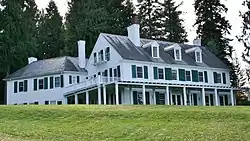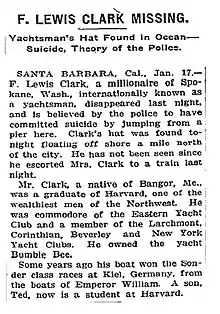F. Lewis Clark | |
|---|---|
| Born | Francis Lewis Clark June 21, 1861 |
| Disappeared | January 16, 1914 (aged 52) |
| Status | Missing for 109 years, 11 months and 29 days |
| Nationality | American |
| Occupation | Industrialist |
| Spouse | Winifred Clark |
Francis Lewis Clark (June 21, 1861 – 1914?) was a prominent American industrialist. He disappeared after dropping off his wife at the train station in Santa Barbara, California.[1]
Career
In 1885 F. Lewis Clark established the C. & C. Mill and Elevator, the largest flouring mill in the Pacific Northwest. Mr. Clark was a founder of the America's Cup race, and sold the land and carried the contract for Louis Davenport to build his famed Davenport Hotel.

In 1898 Lewis Clark and his wife Winifred Clark retained the services of noted architect Kirtland Cutter to design a mansion on 7th Avenue in Spokane, Washington. This 14,400-square-foot (1,340 m2) mansion is currently used for offices, and retains its natural woodwork and original features. In 1910 Clark constructed a second mansion on Hayden Lake, Idaho, as a summer home. The "Honeysuckle Lodge" was the most expensive home in Idaho at the time. This home currently is a country inn known as The Clark House. The house was designed by George Canning Wales of Boston.[2]
On May 10, 1904, Clark was a defendant in the case of "Chemung Mining Co vs Hanley."[3]
In 1906, Clark was vice-president of Spokane's Inland Railway Island Co.[4]
Disappearance

On January 16, 1914, F. Lewis Clark, his chauffeur and valet drove Winifred Clark to the train station. The train was scheduled to depart at 11:30 p.m. Lewis Clark kissed his wife goodbye, left the train and walked to the limousine. He dismissed his chauffeur and valet and walked into the night. Clark mysteriously disappeared and was never heard from again. According to a New York Times article from two days later, he was 'believed by police to have committed suicide by jumping from a pier' in Santa Barbara, and his hat had been found in the water. However, his body was never found.[5] Winifred tried to manage the estate, but by 1922 she was forced to sell all of her possessions.[6]
See also
References
- ↑ "F. Lewis Clark Genealogy". Archived from the original on 2018-03-03.
- ↑ "Honeysuckle Lodge by Jeri Mccroskey". Archived from the original on 2015-05-27. Retrieved 2015-05-26.
- ↑ The Pacific Reporter. West Publishing Company. 1905. pp. 619–.
- ↑ Frederic Nicholas (1906). McGraw Electric Railway Manual: The Red Book of American Street Railways Investments ... McGraw Publishing Company. pp. 406–.
- ↑ "F. LEWIS CLARK MISSING. - Yachtsman's Hat Found in Ocean - Suicide, Theory of the Police. - Front Page - NYTimes.com". The New York Times. 18 January 1914. Archived from the original on 2018-06-19. Retrieved 2018-07-29.
- ↑ "Clarkhouse History". Archived from the original on 2018-03-03.